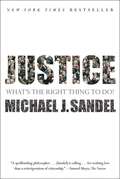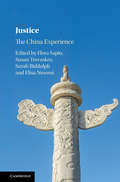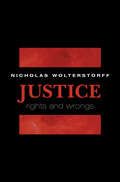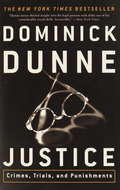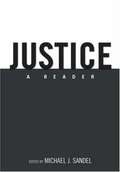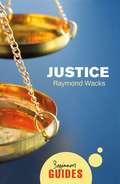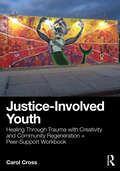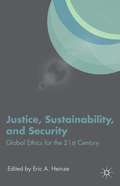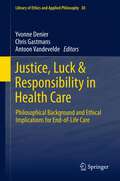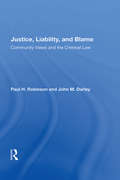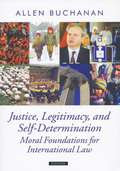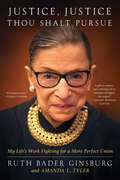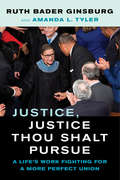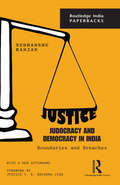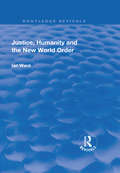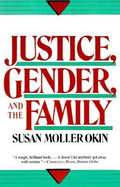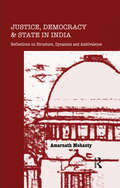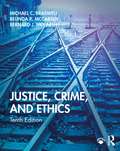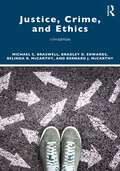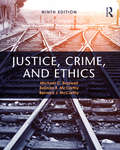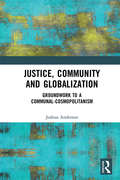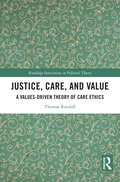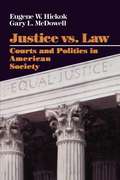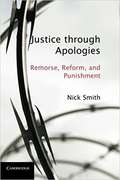- Table View
- List View
Justices and Journalists
by Richard Davis David TarasA key intermediary between courts and the public are the journalists who monitor the actions of justices and report their decisions, pronouncements, and proclivities. Justices and Journalists: The Global Perspective is the first volume of its kind - a comparative analysis of the relationship between supreme courts and the press who cover them. Understanding this relationship is critical in a digital media age when government transparency is increasingly demanded by the public and judicial actions are the subject of press and public scrutiny. Richard Davis and David Taras take a comparative look at how justices in countries around the world relate to the media, the interactive points between the courts and the press, the roles of television and the digital media, and the future of the relationship.
Justice: What's The Right Thing To Do?
by Michael J. Sandel"For Michael Sandel, justice is not a spectator sport," The Nation 's reviewer of Justice remarked. In his acclaimed book-based on his legendary Harvard course-Sandel offers a rare education in thinking through the complicated issues and controversies we face in public life today. It has emerged as a most lucid and engaging guide for those who yearn for a more robust and thoughtful public discourse. "In terms we can all understand," wrote Jonathan Rauch in The New York Times, Justice "confronts us with the concepts that lurk . . . beneath our conflicts. " Affirmative action, same-sex marriage, physician-assisted suicide, abortion, national service, the moral limits of markets-Sandel relates the big questions of political philosophy to the most vexing issues of the day, and shows how a surer grasp of philosophy can help us make sense of politics, morality, and our own convictions as well. Justice is lively, thought-provoking, and wise-an essential new addition to the small shelf of books that speak convincingly to the hard questions of our civic life.
Justice: The China Experience (Law In East Asia Ser.)
by Susan Trevaskes Flora Sapio Sarah Biddulph Elisa NesossiClaims about a pursuit of justice weave through all periods of China's modern history. But what do authorities mean when they refer to 'justice' and do Chinese citizens interpret justice in the same way as their leaders? This book explores how certain ideas about justice have come to be dominant in Chinese polity and society and how some conceptions of justice have been rendered more powerful and legitimate than others. This book's focus on 'how' justice works incorporates a concern about the processes that lead to the making, un-making and re-making of distinct conceptions of justice. Investigating the processes and frameworks through which certain ideas about justice have come to the political and social forefront in China today, this innovative work explains how these ideas are articulated through spoken performances and written expression by both the party-state and its citizenry.
Justice: Rights and Wrongs
by Nicholas WolterstorffWide-ranging and ambitious, Justice combines moral philosophy and Christian ethics to develop an important theory of rights and of justice as grounded in rights. Nicholas Wolterstorff discusses what it is to have a right, and he locates rights in the respect due the worth of the rights-holder. After contending that socially-conferred rights require the existence of natural rights, he argues that no secular account of natural human rights is successful; he offers instead a theistic account. Wolterstorff prefaces his systematic account of justice as grounded in rights with an exploration of the common claim that rights-talk is inherently individualistic and possessive. He demonstrates that the idea of natural rights originated neither in the Enlightenment nor in the individualistic philosophy of the late Middle Ages, but was already employed by the canon lawyers of the twelfth century. He traces our intuitions about rights and justice back even further, to Hebrew and Christian scriptures. After extensively discussing justice in the Old Testament and the New, he goes on to show why ancient Greek and Roman philosophy could not serve as a framework for a theory of rights. Connecting rights and wrongs to God's relationship with humankind, Justice not only offers a rich and compelling philosophical account of justice, but also makes an important contribution to overcoming the present-day divide between religious discourse and human rights.
Justice: Crimes, Trials, and Punishments
by Dominick DunneFor more than two decades,Vanity Fairhas published Dominick Dunne's brilliant, revelatory chronicles of the most famous crimes, trials, and punishments of our time. The pursuit of justice has become his passion — a passion that began during the trial of the man who murdered Dunne's daughter and who was sentenced to six and a half years and released in less than three. Dunne's account of that trial and its shocking result became the first of his many classic essays on justice. Dominick Dunne's essays do much more than simply describe; his investigations have shed new light on those crimes and their perpetrators — and demonstrated how it is possible for some to skirt, even flout, the law. His persistence and personal involvement in the matter of Martha Moxley's murder was an important catalyst in bringing a dormant case back to life. Here in one volume are Dominick Dunne's mesmerizing tales of justice denied and justice affirmed. Whether writing of Vicki Morgan's hideous death; Claus von Bülow's romp through two trials; the media frenzy of Los Angeles in the age of O. J. Simpson; the death by fire of multibillionaire banker Edmund Safra in Monaco; or the ominous silence surrounding the death of Martha Moxley in Greenwich, Connecticut, and the indictment — decades later — of Michael Skakel, Dominick Dunne tells it honestly and tells it from his unique perspective. His search for the truth is relentless. His courage and his storytelling skills shine from every page.
Justice: A Reader
by Michael J. SandelThe readings gathered in this volume are the ones I assign in my undergraduate course, "Justice," an introduction to moral and political philosophy that I have taught at Harvard, on and off, for over 25 years.
Justice: A Beginner's Guide (Beginner's Guides)
by Raymond WacksIn this highly topical introduction, Professor Raymond Wacks explains and evaluates the leading theories of justice that have shaped our societies and their legislative and judicial systems, and explores the extent to which fundamental notions like fairness, equality and freedom are reflected in contemporary society. By analysing some of the world&’s most pressing challenges, including terrorism, corruption and migration, Justice: A Beginner&’s Guide shows how these ideas are applied in practice – and how far we still have to go to achieve social justice.
Justice-Involved Youth: Healing Through Trauma with Creativity and Community Regeneration + Peer-Support Workbook
by Carol CrossIncluding a peer-support workbook with exercises, this book demonstrates the therapeutic value of art practice, both inside and outside institutions, as a more humane approach for children and adolescents affected by mass incarceration. The author discusses how a trauma-informed approach can heal marginalized and ignored citizens and refutes the notion that severe punishment for repeat offenders is essential or effective.Author Carol Cross has decades of experience incorporating therapeutic expressive arts in her professional practice, with a focus on peer-led programs. She advocates a trauma-informed approach using a peer-driven creative process, showing how such programs can intervene in the cycle of violence and contribute to a practice of community preventive care for youth deemed to be at risk. The workbook is built on the research and resources Cross has used within care plans with clinical teams and youth forensics. The user is shown how to build on these teachings and implement or modify the content to suit individual needs. Contributions from persons involved in the judicial system and such intervention programs vet the topics in the workbook as resonating with group participants.This user-friendly book will benefit anyone working with justice-involved children and adolescents, including those working in and around the criminal legal system as well as in programs outside of carceral institutions organized by individuals, groups, or non-profit organizations.
Justice, Sustainability, And Security
by Eric A. HeinzeJustice, Sustainability, and Security not only enhances our knowledge of these issues, but it teases out our moral dimensions and offer prescriptions for how governments and global actors might craft their policies to better consider their effects on the global human condition.
Justice, Luck & Responsibility in Health Care
by Chris Gastmans Antoon Vandevelde Yvonne DenierIn this book, an international group of philosophers, economists and theologians focus on the relationship between justice, luck and responsibility in health care. Together, they offer a thorough reflection on questions such as: How should we understand justice in health care? Why are health care interests so important that they deserve special protection? How should we value health? What are its functions and do these make it different from other goods? Furthermore, how much equality should there be? Which inequalities in health and health care are unfair and which are simply unfortunate? Which matters of health care belong to the domain of justice, and which to the domain of charity? And to what extent should we allow personal responsibility to play a role in allocating health care services and resources, or in distributing the costs? With this book, the editors meet a double objective. First, they provide a comprehensive philosophical framework for understanding the concepts of justice, luck and responsibility in contemporary health care; and secondly, they explore whether these concepts have practical force to guide normative discussions in specific contexts of health care such as prevention of infectious diseases or in matters of reproductive technology. Particular and extensive attention is paid to issues regarding end-of-life care.
Justice, Liability, And Blame: Community Views And The Criminal Law
by Paul H. RobinsonThis book examines shared intuitive notions of justice among laypersons and compares the discovered principles to those instantiated in American criminal codes. It reports eighteen original studies on a wide range of issues that are central to criminal law formulation.
Justice, Legitimacy, And Self-determination: Moral Foundations For International Law
by Allen BuchananThis book articulates a systematic vision of an international legal system grounded in the commitment to justice for all persons. It provides a probing exploration of the moral issues involved in disputes about secession, ethno-national conflict, 'the right of self-determination of peoples,'human rights, and the legitimacy of the international legal system itself. Buchanan advances vigorous criticisms of the central dogmas of international relations and international law, arguing that the international legal system should make justice, not simply peace, among states a primary goal, andrejecting the view that it is permissible for a state to conduct its foreign policies exclusively according to what is in the 'the national interest'. He also shows that the only alternatives are not rigid adherence to existing international law or lawless chaos in which the world's one superpowerpursues its own interests without constraints. This book not only criticizes the existing international legal order, but also offers morally defensible and practicable principles for reforming it. Justice, Legitimacy, and Self-Determination will find a broad readership in political science,international law, and political philosophy. Oxford Political Theory presents the best new work in political theory. It is intended to be broad in scope, including original contributions to political philosophy and also work in applied political theory. The series contains works of outstanding quality with no restrictions as to approach orsubject matter. Series Editors: Will Kymlicka, David Miller, and Alan Ryan
Justice, Justice Thou Shalt Pursue: My Life's Work Fighting for a More Perfect Union
by Ruth Bader Ginsburg Amanda L. TylerRuth Bader Ginsburg&’s final book offers an intimate look at her extraordinary life and details her lifelong pursuit for gender equality and a &“more perfect Union.&”In the fall of 2019, Justice Ruth Bader Ginsburg visited the University of California, Berkeley School of Law to honor her friend, the late Herma Hill Kay, with whom Ginsburg had coauthored the very first casebook on sex-based discrimination in 1974. During Justice Ginsburg&’s visit, she shared her life story with Amanda L. Tyler, a Berkeley Law professor and former Ginsburg law clerk. Their intimate conversation is recorded here in Justice, Justice Thou Shalt Pursue, along with previously unpublished materials that detail Ginsburg&’s long career. These include notable briefs and oral arguments, Ginsburg&’s last speeches, and her favorite opinions that she wrote as a Supreme Court Justice (many in dissent), along with the statements that she read from the bench in those important cases. Each document was carefully chosen by Ginsburg and Tyler to tell the litigation strategy at the heart of Ginsburg&’s unwavering commitment to achieve &“a more perfect Union.&” Ruth Bader Ginsburg was an advocate and jurist for gender equality, ensuring that the United States Constitution leaves no person behind and allows every individual to achieve their full human potential. Her work transformed not just the American legal landscape, but American society. As revealed in these pages, Ginsburg dismantled long-entrenched systems of discrimination based on outdated stereotypes by showing how such laws hold back both genders. With her death, the country lost a hero whose incredible life and legacy made the United States a society in which &“We the People,&” for whom the Constitution is written, includes everyone.
Justice, Justice Thou Shalt Pursue: A Life's Work Fighting for a More Perfect Union (Law in the Public Square #2)
by Ruth Bader GinsburgRuth Bader Ginsburg's last book is a curation of her own legacy, tracing the long history of her work for gender equality and a "more perfect Union." In the fall of 2019, Justice Ruth Bader Ginsburg visited the University of California, Berkeley School of Law to deliver the first annual Herma Hill Kay Memorial Lecture in honor of her friend, the late Herma Hill Kay, with whom Ginsburg had coauthored the very first casebook on sex-based discrimination in 1974. Justice, Justice Thou Shalt Pursue is the result of a period of collaboration between Ginsburg and Amanda L. Tyler, a Berkeley Law professor and former Ginsburg law clerk. During Justice Ginsburg's visit to Berkeley, she told her life story in conversation with Tyler. In this collection, the two bring together that conversation and other materials—many previously unpublished—that share details from Justice Ginsburg's family life and long career. These include notable briefs and oral arguments, some of Ginsburg's last speeches, and her favorite opinions that she wrote as a Supreme Court Justice (many in dissent), along with the statements that she read from the bench in those important cases. Each document was chosen by Ginsburg and Tyler to tell the story of the litigation strategy and optimistic vision that were at the heart of Ginsburg's unwavering commitment to the achievement of "a more perfect Union." In a decades-long career, Ruth Bader Ginsburg was an advocate and jurist for gender equality and for ensuring that the United States Constitution leaves no person behind. Her work transformed not just the American legal landscape, but American society more generally. Ginsburg labored tirelessly to promote a Constitution that is ever more inclusive and that allows every individual to achieve their full human potential. As revealed in these pages, in the area of gender rights, Ginsburg dismantled long-entrenched systems of discrimination based on outdated stereotypes by showing how such laws hold back both genders. And as also shown in the materials brought together here, Justice Ginsburg had a special ability to appreciate how the decisions of the high court impact the lived experiences of everyday Americans. The passing of Justice Ruth Bader Ginsburg in September 2020 as this book was heading into production was met with a public outpouring of grief. With her death, the country lost a hero and national treasure whose incredible life and legacy made the United States a more just society and one in which "We the People," for whom the Constitution is written, includes everyone.
Justice, Judocracy and Democracy in India: Boundaries and Breaches
by Sudhanshu RanjanThis book offers an innovative approach to studying ‘judicial activism’ in the Indian context in tracing its history and relevance since 1773. While discussing the varying roles of the judiciary, it delineates the boundaries of different organs of the State — judiciary, executive and legislature — and highlights the points where these boundaries have been breached, especially through judicial interventions in parliamentary affairs and their role in governance and policy. Including a fascinating range of sources such as legal cases, books, newspapers, periodicals, lectures, historical texts and records, the author presents the complex sides of the arguments persuasively, and contributes to new ways of understanding the functioning of the judiciary in India. This paperback edition, with a new Afterword, updates the debates around the raging questions facing the Indian judiciary. It will be of great interest to students and scholars of law, political science and history, as well as legal practitioners and the general reader.
Justice, Humanity and the New World Order (Routledge Revivals)
by Ian WardThis title was first published in 2003.Justice, Humanity and the New World Order offers a refreshing analysis of current jurisprudential concerns regarding the new world order , by examining them in the intellectual context of the late eighteenth-century Enlightenment. After setting the historical context, the author investigates aspects of Enlightenment political culture as well as aspects of the new world order , including international relations, the European Union and human rights. In conclusion, the author introduces the concept of a new humanism , which he suggests, drawing on certain aspects of Enlightenment political philosophy, can complement the new world order .
Justice, Gender, And The Family
by Susan Moller OkinIn the first feminist critique of modern political theory, Okin shows how the failure to apply theories of justice to the family not only undermines our most cherished democratic values but has led to a major crisis over gender-related issues.
Justice, Democracy and State in India: Reflections on Structure, Dynamics and Ambivalence
by Amarnath MohantyThis book explores how the liberal conception of justice with all its ideological underpinnings is reflected in the framing and working of the Constitution of India, in the adoption of broader socio-economic objectives, in the functioning of judicial and state institutions, and in the formulation and implementation of development strategy. It analyses the dynamics of the relationship between justice, democracy and the state. The book studies the liberal conception of social justice and its sufficiency, and interrogates its performance and adequacy within the structural parameters and cultural conditions of postcolonial India. It provides an analytical exposition of how the borrowed and inadequate conception of liberal justice and democracy inherited from colonial past, and the espousal of the derivative developmental pattern based on modernist and constructivist paradigm, have together failed to achieve the modest target of justice enshrined in the Constitution. Interlinking justice, democracy and state, the book examines their operational dynamics in an integrated framework which has relevance for other Third World countries also because of socio-economic and cultural commonalites.
Justice, Crime, and Ethics
by Michael C. Braswell Belinda R. McCarthy Bernard J. McCarthyJustice, Crime, and Ethics, a leading textbook in criminal justice programs, examines ethical dilemmas pertaining to the administration of criminal justice and professional activities in the field. This tenth edition continues to deliver a broad scope of topics, focusing on law enforcement, legal practice, sentencing, corrections, research, crime control policy, and philosophical issues. The book’s robust coverage encompasses contentious issues such as capital punishment, prison corruption, and the use of deception in police interrogation. The tenth edition includes new material in a number of chapters including "Learning Police Ethics," "Using Ethical Dilemmas in Training Police," "Prison Corruption," "Crime and Justice Myths," "Corporate Misconduct and Ethics," "Ethics and Criminal Justice Research," and "Ethical Issues in Confronting Terrorism." The use of "Case Studies," "Ethical Dilemmas," and "Policy and Ethics" boxes continues throughout the textbook. A new feature for this edition is the inclusion of "International Perspective" boxes in a number of relevant chapters. Students of criminal justice, as well as instructors and professionals in the field, continue to rely on this thorough, dependable resource on ethical decision making in the criminal justice system.
Justice, Crime, and Ethics
by Michael C. Braswell Bradley D. Edwards Belinda R. McCarthy Bernard J. McCarthyJustice, Crime, and Ethics, a leading textbook in criminal justice programs, examines ethical dilemmas pertaining to the administration of criminal justice and professional activities in the field. This 11th edition continues to deliver a broad scope of topics, focusing on law enforcement, legal practice, sentencing, corrections, research, crime control policy, and philosophical issues. The book’s robust coverage encompasses contentious issues such as capital punishment, prison corruption, and the use of deception in police interrogation. The 11th edition includes new material on the impact of social media on crime myths and political misconduct. Law enforcement issues including the George Floyd case and responding to domestic as well as foreign terrorism, including the January 6th insurrection in Washington, DC, are examined. The potential ethical implications of Roe v. Wade being overturned by the Supreme Court are also explored. Emerging issues in corporate misconduct are also discussed including healthcare fraud and corruption as well as crypto-currency fraud. Students of criminal justice, as well as instructors and professionals in the field, continue to rely on this thorough, dependable resource on ethical decision making in the criminal justice system.
Justice, Crime, and Ethics
by Michael C. Braswell Belinda R. Mccarthy Bernard J. MccarthyJustice, Crime, and Ethics, a leading textbook in criminal justice programs, examines ethical dilemmas pertaining to the administration of criminal justice and professional activities in the field. Comprehensive coverage is achieved through focus on law enforcement, legal practice, sentencing, corrections, research, crime control policy, and philosophical issues. The contributions in this book examine ethical dilemmas pertaining to the administration of criminal justice and professional activities in the field.
Justice, Community and Globalization: Groundwork to a Communal-Cosmopolitanism
by Joshua AndersonThis book takes up the tension between globalization and community in order to articulate a new theory of global justice. Although the process of globalization is not new, its current manifestation and consequences are. At the same time, there is a growing recognition of the importance of community, identity and belonging. These two facts have generally been understood to be fundamentally in tension, both theoretically and descriptively. This book seeks to resolve this tension, and then draw out the implications for a theory of global justice and an understanding of the value and purpose of community. Importantly, the book argues, not only does an acceptance of the significance of the fact of globalization and the importance of community call for cosmopolitan duties and obligations, but it also calls into question the legitimacy and justification of the traditional nation-state. Aimed primarily at scholars working on issues related to political philosophy, globalization and global justice, the book will appeal to readers in law, politics, philosophy, and sociology.
Justice, Care, and Value: A Values-Driven Theory of Care Ethics (Routledge Innovations in Political Theory)
by Thomas RandallIn Justice, Care, and Value Thomas Randall argues for the radical potential of care ethics as a distinct and preferable theory of distributive justice. Advancing the feminist literature, this book defends a vision of society that can best enable caring relations to flourish. Specifically, Randall proposes a values-driven theory of care ethics that derives normative criteria for evaluating the moral worth of caring relations and their surrounding institutions via a classification of the values of care. They argue that such a theory gives us unique and meaningful solutions to contemporary questions of distributive justice across personal, political, global, and intergenerational domains. In doing so, the book makes significant strides to engage care ethics with the broader moral and political philosophy literature. Topical and interdisciplinary, Randall demonstrates that care ethics has the conceptual resources to ground distributive theories of socialism, territorial and natural resource rights, obligations to future generations, and historic redress. The book will be of great interest to academics, researchers, and students of feminist philosophy, but also of liberalism, political economy, and theories of global and intergenerational justice.
Justice vs. Law
by Eugene Hickok Gary L. MacdowellA detailed analysis of a child-abuse case reveals all of the aspects of the judicial system, including the limits of justice, and makes an argument for judicial restraint.
Justice through Apologies: Remorse, Reform, and Punishment
by Nick SmithIn this follow up to I Was Wrong: The Meanings of Apologies, Nick Smith expands his ambitious theories of categorical apologies to civil and criminal law. After rejecting court-ordered apologies as unjustifiable humiliation, this book explains that penitentiaries were originally designed to bring about penance - something like apology - and that this tradition has been lost in the assembly line of mass incarceration. Smith argues that the state should modernize these principles and techniques to reduce punishments for offenders who demonstrate moral transformation through apologizing. Smith also explains the counterintuitive situation whereby apologies come to have considerable financial worth in civil cases because victims associate them with priceless matters of the soul. Such confusions allow powerful wrongdoers to manipulate perceptions to disastrous effect, such as when corporations or governments assert that apologies do not equate to accepting blame or require reform or redress.

